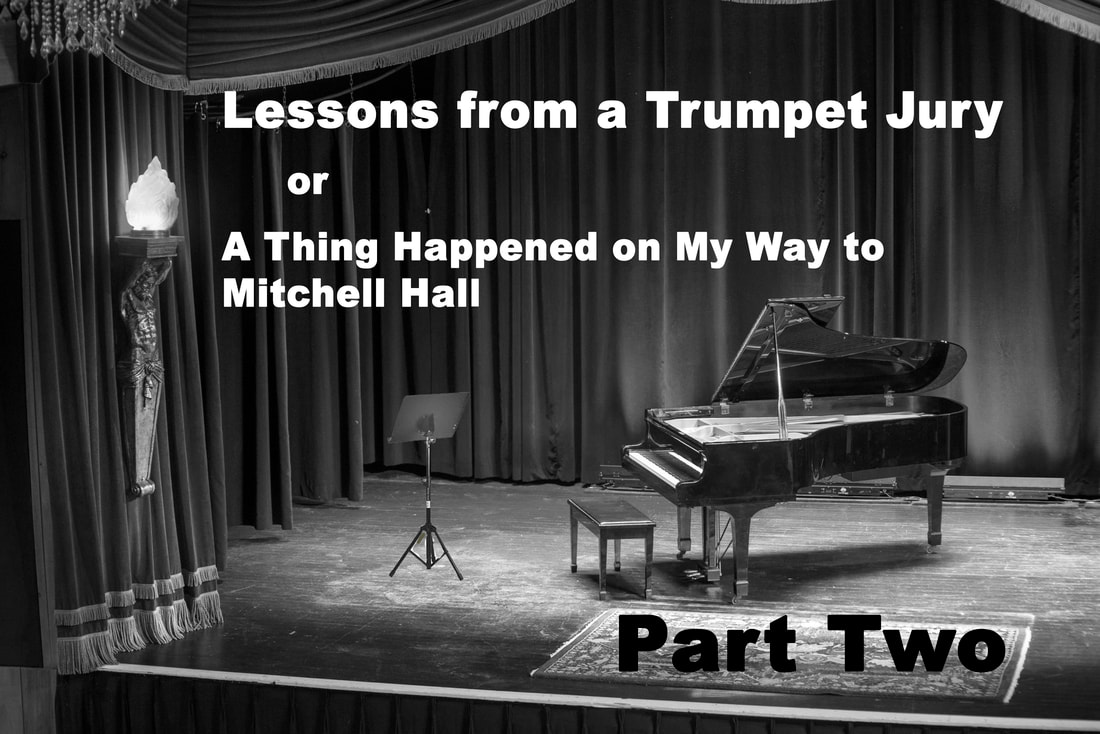It was freshman year at the University of Delaware and I was a first-year music education major, majoring on trumpet. I was in the wings of Mitchell Hall, waiting with my accompanist, Charlotte Joslin, to walk out and play my first trumpet jury.
I was performing a Rafael Méndez trumpet solo.
Walking on stage, the two spotlights obliterated anything in the house that now had adapted crypt-like qualities.
I played the piece.
After I was done, I stood there silently peering into the lights.
I heard footsteps approaching from the house.
It was the low brass professor, a rather sizable man, who spoke with an Alabama drawl.
He walked right up to me, maybe two feet away from my face, seemly unaware of the concept of personal space.
Everything about him exuded disgust and cheap aftershave.
“That is the worst music I have ever heard in my life.”
Pause.
“There is no place for you in the world of music.”
I didn’t move or break eye contact with him.
As he glared at me, Charlotte began to cry. I could hear her whimpering as she slid down behind the piano desk.
I finally responded.
“Are we done here? Is that it?”
He flared his nostrils, widened his eyes, but said nothing more as he walked off stage and back into the cavernous darkness of the house.
Afterwards, I took Charlotte out for a burger and Coke to help make up for her moments of distress caused by me.
My Reaction – or Lack Thereof
What this low brass teacher didn’t know was that I had survived a seven-year gauntlet of sadomasochistic nuns who, in comparison, made his sauce look weak.
If he thought he was going to impress me with his cliché insults, he had to contend with the creative jailers who had repeatedly beat me and made me ingest dusty holy water.
This is not to say that his words had no effect on me.
I placed him in context with other musicians I had met in my career.
My career, you ask?
Yes. I already saw myself as a musician and knew that I had marketable skills.
Before I had ever stepped into a college class, I had already played close to a thousand gigs.
Even more importantly, one of the things I learned while paying my dues was that you criticize the performance, not the performer, a concept that had eluded this low brass teacher on his way to a teaching gig in a college.
Could I have played the jury better?
Of course.
But that’s what I said after almost every gig I had ever played previous to that jury: I could have done it better – and I will next time.
Take Aways for Music Educators
Never let anyone define you.
When confronted with negativity, don’t take the bait - always choose to eschew the drama.
If you are going to predict a student’s future, tell them that they will be successful.
Criticize the performance, not the performer.
Praise the effort anyone makes in any field of endeavor when they travel the road to its destination without giving up along the way.
Training hard will give you confidence and mettle when you’re eventually in the arena. If you only pretended to train hard and still choose to enter the arena, all bets are off and instead of confidence, you will quickly learn what fear tastes like.
Realize that all who are the most successful in achieving their goals demonstrate a curious trait: they help others achieve their goals.
Your goals belong to you and no one else. At the end of the day, let others be responsible for their goals; you be responsible for yours.
Your successes belong to you as but you will only experience the true magnitude of your success when you share your success with those who helped you along the way.

 RSS Feed
RSS Feed